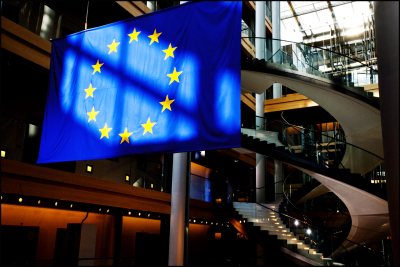Current developments have alarmingly revealed the extent of corporate lobbying in negotiations on safeguarding the climate. Take COP28, where a record number of fossil fuel lobbyists made an appearance, or the upcoming COP29 being hosted by Azerbaijan, a major oil and gas exporting country. This shows how urgent it is to protect these discussions from big polluters seeking to derail them for the sake of profit.
This raises critical questions about the state of climate legislation at EU level: is EU climate legislation at risk of corporate capture? In the second instalment of our investigations into undue influence on EU climate legislation (check out the first here), we’ve looked at meetings on EU Green Deal policies in both the European Parliament and the European Commission, checking which organisations lobby these policies, and how often.
We found that the Green Deal is one of the most heavily lobbied policies in both the Commission and the Parliament. Climate policy-related meetings amount to 3737 meetings in the Commission and 6,627 meetings in the Parliament, constituting 17% and 12% of all meetings respectively.

Most worryingly, we found two fossil fuel giants in the top 10 organisations with the largest number of meetings in the European Commission. When looking at the organisations seeking to influence the Commission on climate legislation, we found that only 27% were held with non-commercial organisations, with two-thirds representing corporate interests.

But that’s not the whole story. This huge discrepancy between commercial and non-commercial interests accessing those making our climate policies is exacerbated by corporations’ extensive use of networks. Networks often represent the interests of an entire industry (e.g., automobiles or renewable energy) or conduct advocacy activities on a single topic (e.g., pesticides) to maximise legislative impact, and, as such, also boast considerable financial resources. This allows corporations to multiply their entry points into EU policy, a privilege most non-commercial organisations do not have.
We’ve examined the network effect on EU climate legislation.
We looked at all Green Deal-related meetings published from the start of the current legislature in June 2019 until December 2023 for the top 10 NGOs and Companies. We found that companies more than double their access through their networks in both Commission and Parliament, while NGOs currently do not have the chance to make their voices heard to the same extent. To put that in numbers: networks allowed companies and groups to increase their contacts in the European Commission by 140%. In the European Parliament, they even increased their contacts by 250%. NGOs, conversely, were only able to increase their access by a mere 23% in the Commission, and a meagre 4% in the Parliament through networks.

In fact, this may be just the tip of the iceberg. The rule on publishing lobbying meetings in the Commission only applies to Commissioners and members of their cabinet, as well as Directors-General. This means we do not have the full picture of lobbying meetings, including lower ranking officials. In the Parliament, MEPs have only been required to publish all their meetings since November 2023. Before this, only MEPs holding specific legislative roles were required to publish their meetings. Compounding this is the fact that many integrity loopholes remain for those seeking to exert undue influence in climate policies. This means that many lobby meetings are likely still being conducted below the surface.
What do these dynamics say about how climate policy is being shaped at EU level? Our analysis clearly shows that access to EU climate policymaking is skewed towards the lobby efforts of corporate interests. This potentially provides big polluters a far larger say, while the voices of those most affected by the climate crisis are drowned out. For the sake of the Green Deal and the future of our planet, this situation needs to change urgently, both in the Commission and the Parliament. Civil society deserves a seat at the table just as much as corporations do.
Recommendations
- The European Parliament and European Commission must adopt clear guidelines and rules to ensure balanced stakeholder consultation, especially when engaging with the fossil fuel industry on climate legislation.
- The Commission should publish all meetings held with lower ranking officials.
- The European Parliament should adopt the Commission best practice of making lobby meetings available on a central website, in open data format, to enable proper public scrutiny.
Check out our full infographic below! Download it here.






